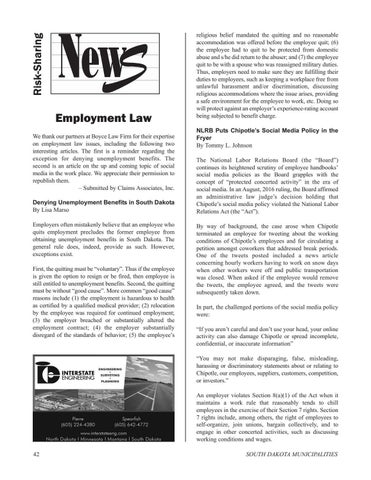Risk-Sharing
Employment Law We thank our partners at Boyce Law Firm for their expertise on employment law issues, including the following two interesting articles. The first is a reminder regarding the exception for denying unemployment benefits. The second is an article on the up and coming topic of social media in the work place. We appreciate their permission to republish them. – Submitted by Claims Associates, Inc. Denying Unemployment Benefits in South Dakota By Lisa Marso Employers often mistakenly believe that an employee who quits employment precludes the former employee from obtaining unemployment benefits in South Dakota. The general rule does, indeed, provide as such. However, exceptions exist. First, the quitting must be “voluntary”. Thus if the employee is given the option to resign or be fired, then employee is still entitled to unemployment benefits. Second, the quitting must be without “good cause”. More common “good cause” reasons include (1) the employment is hazardous to health as certified by a qualified medical provider; (2) relocation by the employee was required for continued employment; (3) the employer breached or substantially altered the employment contract; (4) the employer substantially disregard of the standards of behavior; (5) the employee’s
religious belief mandated the quitting and no reasonable accommodation was offered before the employee quit; (6) the employee had to quit to be protected from domestic abuse and s/he did return to the abuser; and (7) the employee quit to be with a spouse who was reassigned military duties. Thus, employers need to make sure they are fulfilling their duties to employees, such as keeping a workplace free from unlawful harassment and/or discrimination, discussing religious accommodations where the issue arises, providing a safe environment for the employee to work, etc. Doing so will protect against an employer’s experience-rating account being subjected to benefit charge. NLRB Puts Chipotle’s Social Media Policy in the Fryer By Tommy L. Johnson The National Labor Relations Board (the “Board”) continues its heightened scrutiny of employee handbooks’ social media policies as the Board grapples with the concept of “protected concerted activity” in the era of social media. In an August, 2016 ruling, the Board affirmed an administrative law judge’s decision holding that Chipotle’s social media policy violated the National Labor Relations Act (the “Act”). By way of background, the case arose when Chipotle terminated an employee for tweeting about the working conditions of Chipotle’s employees and for circulating a petition amongst coworkers that addressed break periods. One of the tweets posted included a news article concerning hourly workers having to work on snow days when other workers were off and public transportation was closed. When asked if the employee would remove the tweets, the employee agreed, and the tweets were subsequently taken down. In part, the challenged portions of the social media policy were: “If you aren’t careful and don’t use your head, your online activity can also damage Chipotle or spread incomplete, confidential, or inaccurate information” “You may not make disparaging, false, misleading, harassing or discriminatory statements about or relating to Chipotle, our employees, suppliers, customers, competition, or investors.” An employer violates Section 8(a)(1) of the Act when it maintains a work rule that reasonably tends to chill employees in the exercise of their Section 7 rights. Section 7 rights include, among others, the right of employees to self-organize, join unions, bargain collectively, and to engage in other concerted activities, such as discussing working conditions and wages.
42
SOUTH DAKOTA MUNICIPALITIES

















